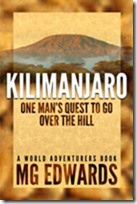December 28, 2010
The rain conveniently stopped at about 6:00 a.m. this morning. I woke up and fell back to sleep several times during the night whenever I felt compelled to rotate my body inside my constricting sleeping bag like a rotisserie chicken. I fretted over the prospect of climbing in pouring rain, but we were granted a reprieve and hiked in partly cloudy weather through a light, clinging mist. The morning felt fresh and cool; a great way to keep cool while shedding heat through repetitive body movements.
I spent much of my evening last night pursuing what my wife calls “a spiritual journey.” I pondered the past, present, and future in the austere confines of my tent. While you don’t necessary have to worry about imminent risk on Kilimanjaro like you do on more technically challenging climbs such as Everest, you inevitably think about life and its implications when you have plenty of time to yourself. You may have your portable music player, a book (or 60, as I do with my Amazon Kindle), or a journal to keep you company, but you invariably find your mind lapsing into moments of contemplation. If you’re a chronic thinker, musing will consume most of your time alone. Even those not prone to sentimentality or serendipity will find themselves thinking about life anywhere but on a cold mountain.
I also thought of the men (they’re mostly men as far as I can tell) who work on this mountain as guides, porters, cooks, and in other auxiliary roles. To many, climbing Kilimanjaro is a job that pays the bills. It’s not very lucrative but still worth it. Considering that the worse of environmental conditions still lay ahead of us, I cannot imagine making this a career. Even though they depend on the guides and porters to reach the summit, some climbers seem to regard them as servants. They are blessing in a hostile, uninviting environment that would be uninhabited by humans were it not for the climbers who set aside logic to achieve an irrational goal.
Today’s climb was utterly exhausting. We scaled a mountain flank to a river gorge and followed it for two hours until breaking away and scaling the first peak. It took us over four hours to conquer three ridges before reaching Rongai Camp 2 over 3,500 meters above sea level. Thick Alpine forest gave way to a wetland with grass and a smattering of trees warped by the continual changes in climate and season from wet to dry and back (we did the climb during the second, shorter wet season). The steepness left me winded with aching legs and a slight cough but none the worse for wear. I tried to regulate my breathing through my nose but had to abandon this exercise as the incline steepened and resorted to mouth breathing. I needed all the oxygen my lungs could get!
A clear view of the horizon from 3,500 meters up is simply spectacular. It’s as if you can see a hundred miles across the Serengeti plains into Kenya. Kibo Peak, the mountain’s highest point, is clearly visible above you and appears deceivingly reachable. It almost beckons you to the summit; a temptation you soon learn stimulates a false confidence that evaporates as soon as you begin your final ascent.




